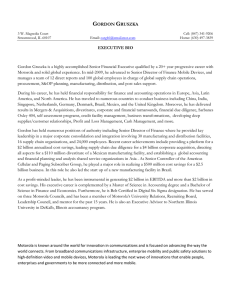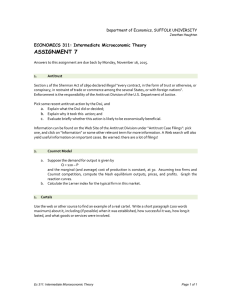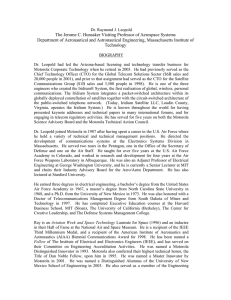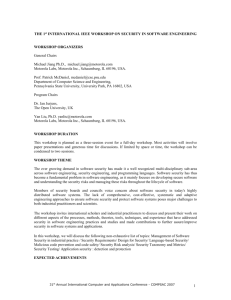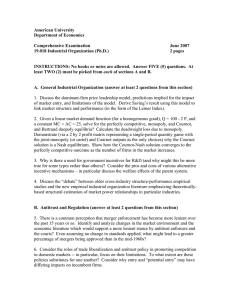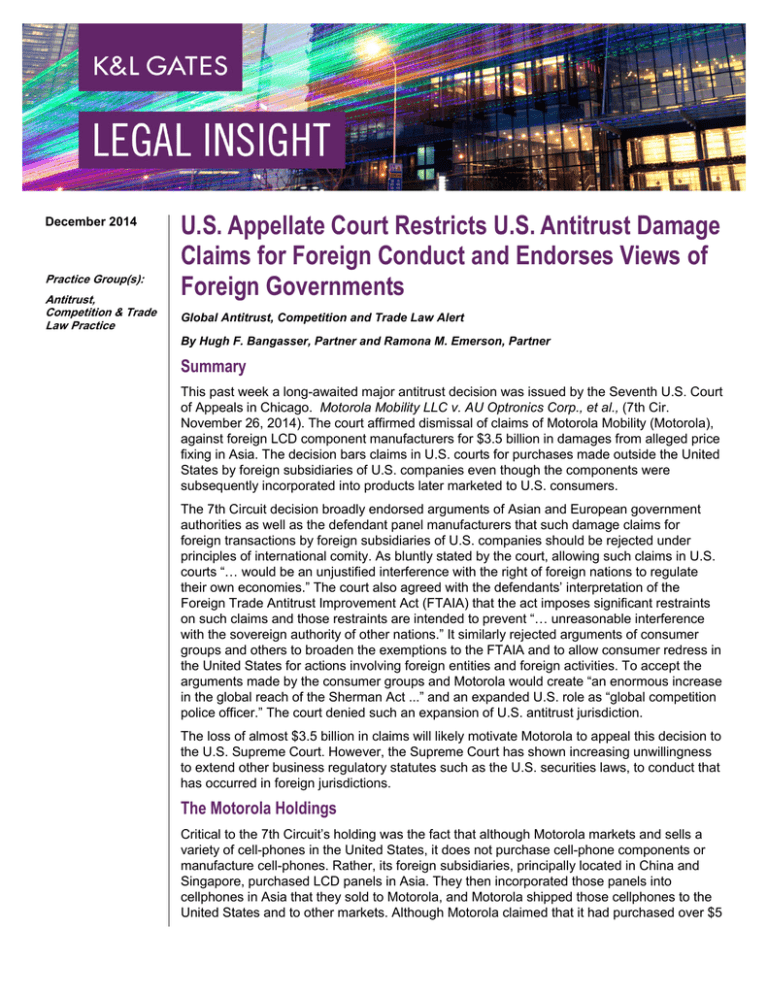
December 2014
Practice Group(s):
Antitrust,
Competition & Trade
Law Practice
U.S. Appellate Court Restricts U.S. Antitrust Damage
Claims for Foreign Conduct and Endorses Views of
Foreign Governments
Global Antitrust, Competition and Trade Law Alert
By Hugh F. Bangasser, Partner and Ramona M. Emerson, Partner
Summary
This past week a long-awaited major antitrust decision was issued by the Seventh U.S. Court
of Appeals in Chicago. Motorola Mobility LLC v. AU Optronics Corp., et al., (7th Cir.
November 26, 2014). The court affirmed dismissal of claims of Motorola Mobility (Motorola),
against foreign LCD component manufacturers for $3.5 billion in damages from alleged price
fixing in Asia. The decision bars claims in U.S. courts for purchases made outside the United
States by foreign subsidiaries of U.S. companies even though the components were
subsequently incorporated into products later marketed to U.S. consumers.
The 7th Circuit decision broadly endorsed arguments of Asian and European government
authorities as well as the defendant panel manufacturers that such damage claims for
foreign transactions by foreign subsidiaries of U.S. companies should be rejected under
principles of international comity. As bluntly stated by the court, allowing such claims in U.S.
courts “… would be an unjustified interference with the right of foreign nations to regulate
their own economies.” The court also agreed with the defendants’ interpretation of the
Foreign Trade Antitrust Improvement Act (FTAIA) that the act imposes significant restraints
on such claims and those restraints are intended to prevent “… unreasonable interference
with the sovereign authority of other nations.” It similarly rejected arguments of consumer
groups and others to broaden the exemptions to the FTAIA and to allow consumer redress in
the United States for actions involving foreign entities and foreign activities. To accept the
arguments made by the consumer groups and Motorola would create “an enormous increase
in the global reach of the Sherman Act ...” and an expanded U.S. role as “global competition
police officer.” The court denied such an expansion of U.S. antitrust jurisdiction.
The loss of almost $3.5 billion in claims will likely motivate Motorola to appeal this decision to
the U.S. Supreme Court. However, the Supreme Court has shown increasing unwillingness
to extend other business regulatory statutes such as the U.S. securities laws, to conduct that
has occurred in foreign jurisdictions.
The Motorola Holdings
Critical to the 7th Circuit’s holding was the fact that although Motorola markets and sells a
variety of cell-phones in the United States, it does not purchase cell-phone components or
manufacture cell-phones. Rather, its foreign subsidiaries, principally located in China and
Singapore, purchased LCD panels in Asia. They then incorporated those panels into
cellphones in Asia that they sold to Motorola, and Motorola shipped those cellphones to the
United States and to other markets. Although Motorola claimed that it had purchased over $5
U.S. Appellate Court Restricts U.S. Antitrust Damage Claims for Foreign
Conduct and Endorses Views of Foreign Governments
billion worth of LCD panels from cartel members, the 7th Circuit described this claim as a
“critical misstatement.” For this and various other reasons, it similarly was dismissive of
Motorola’s claims that Motorola was the “target” of the cartel and that it was the “real buyer”
of the LCD panels from the defendants.
The court held that Motorola’s foreign subsidiaries, not Motorola, were the “immediate
victims” of the price fixing of LCD panels. These entities had a legal identity separate and
distinct from that of Motorola. Because the foreign subsidiaries had chosen to be governed
by foreign law, the subsidiaries must seek relief in foreign courts under the restrictions of
foreign law. Motorola as the U.S. parent of a foreign company injured outside the United
States also had no legal standing, i.e., no right to sue, or to recover damages in U.S. courts
for the injuries of its foreign subsidiary.
The court described Motorola and purchasers of Motorola cell-phones as “… at most
derivative victims” and noted that such “[d]erivative injury rarely gives rise to a claim under
[U.S.] antitrust law.” The court noted that the U.S. Supreme Court has refused to allow a
customer of the purchaser who paid a cartel price (known as an “indirect purchaser”) to sue
members of a price fixing cartel. It found no basis for Motorola’s argument that unlike the
situation with domestic U.S. sales, the FTAIA implicitly allowed indirect purchasers’ claims
when the conduct occurred outside the United States. It also was not persuaded by the
argument of various groups and commentators that denying a damage award to Motorola
customers who purchased Motorola cell-phones incorporating those LCD panels would
unjustifiably deprive such consumers of a right to obtain compensation for the alleged
overcharge. Finally, despite the importance of the decision for private civil antitrust litigation,
the appellate court specifically noted that its holdings as to the Motorola claims should not be
read as having any implications for federal government antitrust enforcement activities.
Implications of the Motorola Decision
This decision by one of the most influential federal appeals courts, particularly if it is upheld
by the U.S. Supreme Court, could have broad implications for future antitrust litigation and
the structure and operation of U.S. multi-nationals.
• If this decision is upheld by the U.S. Supreme Court, it will create a significant barrier to
civil antitrust treble damage actions in the United States for foreign conduct that impacts
the foreign subsidiaries of a U.S. company. Antitrust claims by a U.S. parent company or
by U.S. consumers of products incorporating a price-fixed component will be barred.
• Expect more private antitrust litigation to be filed in multiple foreign jurisdictions rather
than a single suit in U.S. where the law provides very generous remedies such as treble
damages. Many Asian jurisdictions now allow some form of private competition actions to
recovery antitrust damages. Also, several member states of the European Union (E.U.)
permit private actions and, under the new E.U. Directive on damages in competition
actions, all member states must adopt some form of private damage actions for
competition violations within the next two years. Some of these jurisdictions allow the type
of redress for indirect purchasers not allowed under U.S. law.
• U.S. companies commonly utilize global supply chains with procurement, manufacturing
and billing conducted through local subsidiaries. Companies will need to re-evaluate
whether the benefits of avoiding various U.S. regulatory and tax requirements through
use of foreign subsidiaries outweigh the inability of the company to recover under the
2
U.S. Appellate Court Restricts U.S. Antitrust Damage Claims for Foreign
Conduct and Endorses Views of Foreign Governments
generous provisions of the U.S. antitrust laws for direct injuries to their foreign
subsidiaries.
• Even if they retain foreign subsidiaries, the U.S. companies may need to consider
whether the US parent companies should be more directly engaged in foreign
procurement activities in order to preserve rights to enforce U.S. antitrust law with respect
to the procurement transactions.
* The authors served as counsel to one of the LCD defendants in the government
antitrust/competition proceedings in the United States and the E.U. and in civil antitrust
damage actions in the United States.
Authors:
Hugh F. Bangasser
Hugh.bangasser@klgates.com
+1.206.370.7607
Ramona M. Emerson
Ramona.emerson@klgates.com
+1.206.370.6748
Anchorage Austin Beijing Berlin Boston Brisbane Brussels Charleston Charlotte Chicago Dallas Doha Dubai Fort Worth Frankfurt
Harrisburg Hong Kong Houston London Los Angeles Melbourne Miami Milan Moscow Newark New York Orange County Palo Alto Paris
Perth Pittsburgh Portland Raleigh Research Triangle Park San Francisco São Paulo Seattle Seoul Shanghai Singapore Spokane
Sydney Taipei Tokyo Warsaw Washington, D.C. Wilmington
K&L Gates comprises more than 2,000 lawyers globally who practice in fully integrated offices located on five
continents. The firm represents leading multinational corporations, growth and middle-market companies, capital
markets participants and entrepreneurs in every major industry group as well as public sector entities, educational
institutions, philanthropic organizations and individuals. For more information about K&L Gates or its locations,
practices and registrations, visit www.klgates.com.
This publication is for informational purposes and does not contain or convey legal advice. The information herein should not be used or relied upon in
regard to any particular facts or circumstances without first consulting a lawyer.
© 2014 K&L Gates LLP. All Rights Reserved.
3

